C.Africa's Leap Into Bitcoin Leaves Its People Bemused
In the Central African Republic (CAR), nine out of 10 people do not have internet, and only one in seven has electricity -- that is, when there are no power cuts.
Yet the CAR has just followed El Salvador in adopting bitcoin as legal tender, a currency that requires access to the net to be bought, sold or used.
Foreign experts and CAR citizens themselves are struggling to understand why the world's second least developed economy has announced this leap into monetary hyperspace.
Among people queueing at one of the rare automatic teller machines (ATMs) in the capital Bangui, the word "bitcoin" stirred befuddlement.
[...]
On April 28, President Faustin Archange Touadera announced that lawmakers had unanimously approved a bill that legalised the use of bitcoin alongside the CFA franc.
All transactions using the cryptocurrency, including payment of taxes, are being authorised.
Government spokesman Serge Ghislain Djorie told AFP: "We are going to launch an awareness campaign and shortly introduce fibre optic cable -- a low internet connection is enough to buy cryptocurrency."
But even among CAR's business community, which in theory is best placed to use bitcoin and other cryptocurrencies regulated by the new law, scepticism runs deep.
[...]
Locked in a nine-year-old civil conflict, the CAR is heavily dependent on mineral extraction, much of which is informal, for its economy.
In a report in December 2020, a US watchdog called The Sentry said the CAR had become "a breeding ground for transnational criminal networks."
"Money laundering and the trafficking of natural resources, drugs, weapons, and diplomatic passports are rampant," it said.
The CFA franc that until now was the CAR's sole legal tender is a regional currency backed by France and pegged to the euro.
Other members of the currency are Cameroon, Chad, the Republic of Congo, Gabon and Equatorial Guinea.
Didier Loukakou, regulatory chief at the Central African Financial Market Surveillance Commission, said the six had been discussing plans to regulate crypto-currencies.
But, he said, "we were not warned by Bangui about its decision."
Some experts see a possible explanation for Touadera's announcement in his entwinement with Russia, perceived as desperate for currency after Western countries imposed sanctions over its invasion of Ukraine.
In 2020, Russia sent paramilitaries to shore up Touadera as armed groups advanced on the capital.
France and rights campaigners describe these operatives as mercenaries from the Wagner group, which reputedly receives mineral wealth in exchange for their services.
"The context, given systemic corruption and a Russian partner facing international sanctions, does encourage suspicion," said Thierry Vircoulon, a specialist on Central Africa at the French Institute of International Relations (IFRI) think tank.
"Russia's search for ways to get around international sanctions is an invitation to be cautious."
But some voices, including the head of the International Monetary Fund, Kristalina Georgieva, have voiced doubts that digital currencies can be an effective tool for bypassing sanctions.
>>> Read the full article on IBT's website

Media:

Share






